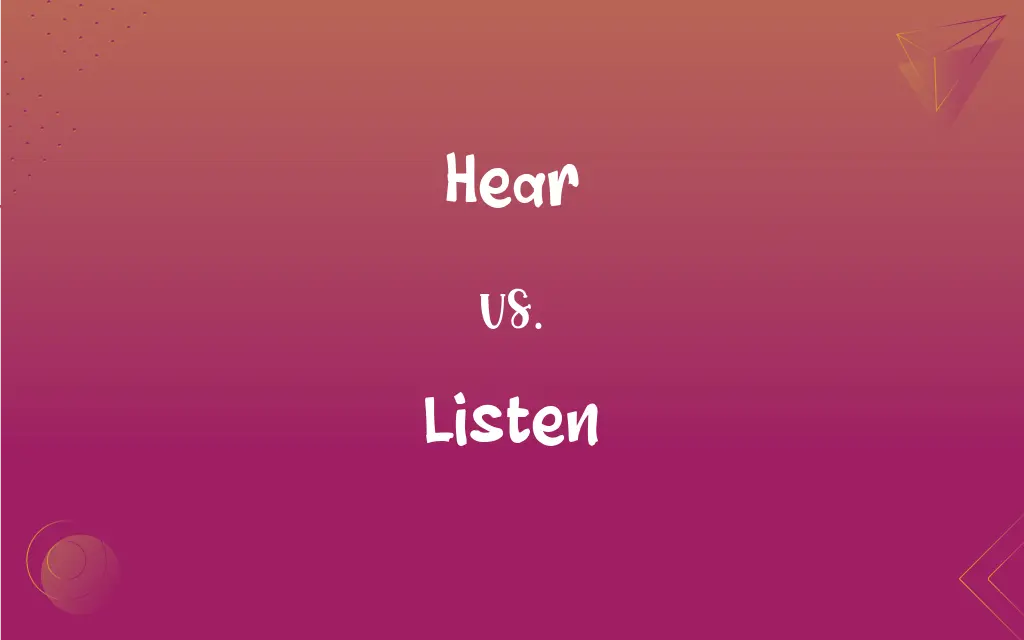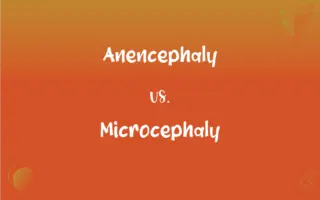Hear vs. Listen: What's the Difference?
Edited by Aimie Carlson || By Janet White || Published on January 5, 2024
Hearing is the involuntary act of perceiving sound, while listening is the intentional act of focusing attention on the sound for understanding.

Key Differences
Hearing is a passive, physiological process where sound waves are received by the ears. Listening, in contrast, is an active process that requires conscious effort and attention to interpret and understand sounds.
One can hear without listening, as hearing does not necessarily imply comprehension or attention. Listening involves not just hearing the sound but also processing and analyzing it for meaning.
Hearing is a sensory function and the first step in the auditory process. Listening goes beyond just sensing sound; it involves engaging with the content of what is heard.
Hearing is automatic and does not require conscious effort, occurring whenever sound waves reach the ears. Listening requires a deliberate choice to focus on and interpret the sounds being heard.
In communication, merely hearing words is not sufficient; effective communication requires active listening, which includes understanding and responding appropriately to what is being said.
ADVERTISEMENT
Comparison Chart
Nature
Involuntary, automatic
Voluntary, intentional
Process
Physiological reception
Active attention and focus
Involvement
Passive
Active
Purpose
Sensing sound
Understanding and interpreting sound
Communication Role
Basic sensory function
Essential for effective communication
ADVERTISEMENT
Hear and Listen Definitions
Hear
To hear is to perceive sound through the ear.
I could hear the birds chirping outside my window.
Listen
Listening involves actively trying to understand what is being heard.
He listened intently to the lecture to grasp the complex concepts.
Hear
To hear is to be aware of sound through auditory sensation.
She heard the alarm clock but didn't wake up.
Listen
To listen is to give attention to sound or speech.
Listen carefully to the safety instructions before the flight.
Hear
Hearing is the physiological process of sound perception.
As we age, our ability to hear high frequencies often diminishes.
Listen
To listen is to concentrate on hearing something.
She listens to classical music to relax after work.
Hear
Hearing refers to the involuntary act of sound reception.
Even in sleep, we can hear noises around us.
Listen
Listening means focusing on and interpreting auditory stimuli.
When you listen to someone, you understand not just their words, but also their emotions.
Hear
To hear is to receive sound waves through the ears.
I could faintly hear the music from the distant festival.
Listen
To listen is to pay attention to someone or something in order to hear them.
He had to listen closely to hear his friend's whisper in the noisy room.
Hear
To perceive (sound) by the ear
Can you hear the signal?.
Listen
To make an effort to hear something
Listen to the radio.
Listen for the bell that ends class.
Hear
To learn by hearing; be told by others
I heard she got married.
Listen
To pay attention; heed
“She encouraged me to listen carefully to what country people called mother wit” (Maya Angelou).
FAQs
Is hearing a conscious process?
No, hearing is a passive and automatic sensory process.
Does hearing involve understanding?
Hearing itself does not involve understanding; it's merely the reception of sound.
What does it mean to hear?
Hearing is the involuntary act of perceiving sound through the ears.
Can hearing occur without listening?
Yes, one can hear sounds without actively listening to them.
What is required for effective hearing?
Effective hearing requires a functioning auditory system but no conscious effort.
Why is listening important in conversations?
Listening is crucial in conversations for understanding and appropriately responding to others.
Can hearing be improved?
Hearing ability is primarily physiological, though certain devices can aid in better hearing.
Can one listen without hearing?
Listening typically requires hearing, but one can also listen by paying attention to non-auditory signals, like sign language.
What does it mean to listen?
Listening is the intentional act of focusing attention on sound to understand and interpret it.
What is required for effective listening?
Effective listening requires attention, concentration, and the intent to understand.
Does listening involve response?
Listening often involves a mental or physical response based on the understanding of the sound.
How does hearing aid in communication?
Hearing aids in communication by allowing us to perceive the sounds made by others.
How does age affect hearing?
Age can affect hearing, often reducing the ability to hear higher frequencies.
Is listening an active process?
Yes, listening is an active, conscious process that involves engagement with the sound.
Is listening important for learning?
Listening is essential for learning, as it helps in understanding and retaining information.
Can one listen to non-verbal sounds?
Yes, one can listen to non-verbal sounds like music or environmental noises.
What role does attention play in listening?
Attention is key in listening; it allows us to focus and interpret the sounds we hear.
What are the signs of good listening?
Good listening is indicated by attentiveness, nodding, maintaining eye contact, and appropriate responses.
Are there techniques to improve listening?
Yes, active listening techniques can improve one’s ability to listen effectively.
How does culture affect listening?
Cultural norms can influence listening styles and the interpretation of verbal and non-verbal cues.
About Author
Written by
Janet WhiteJanet White has been an esteemed writer and blogger for Difference Wiki. Holding a Master's degree in Science and Medical Journalism from the prestigious Boston University, she has consistently demonstrated her expertise and passion for her field. When she's not immersed in her work, Janet relishes her time exercising, delving into a good book, and cherishing moments with friends and family.
Edited by
Aimie CarlsonAimie Carlson, holding a master's degree in English literature, is a fervent English language enthusiast. She lends her writing talents to Difference Wiki, a prominent website that specializes in comparisons, offering readers insightful analyses that both captivate and inform.






































































